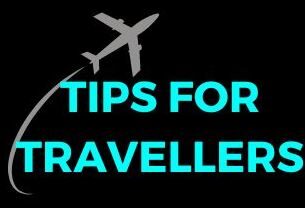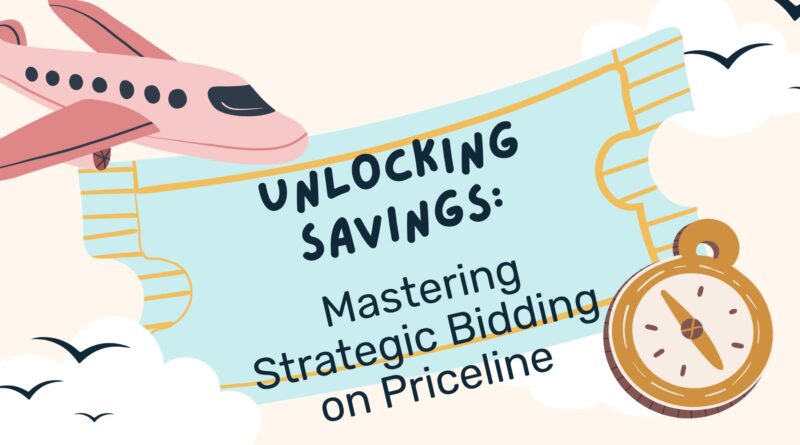Unlocking Savings: Mastering Strategic Bidding on Priceline
Priceline is a popular online platform that offers discounted rates on hotels, flights, and car rentals through a unique bidding system. Understanding how to strategically bid on Priceline can help travelers score incredible deals and save significant amounts of money.
Priceline revolutionized the travel industry with its innovative approach to booking accommodations and flights through a unique bidding system. Unlike traditional booking platforms where travelers simply choose from listed prices, Priceline allows users to bid on their desired travel arrangements.
How Priceline’s Bidding System Works
- Name Your Own Price: One of Priceline’s hallmark features is the “Name Your Own Price” tool. This tool empowers travelers to specify the price they are willing to pay for a hotel room, flight, or rental car, along with their preferred location and star rating (for hotels).
- Opaque Booking: In addition to Name Your Own Price, Priceline offers opaque booking options. This means that while travelers won’t see the specific hotel or airline until after booking, they can still choose the general location and star rating. Opaque bookings often come with significant discounts, making them attractive for budget-conscious travelers.
- Dynamic Pricing: Priceline’s system employs dynamic pricing, which means that prices can fluctuate based on demand, supply, and other market factors. This dynamic nature allows travelers to potentially snag last-minute deals or find lower prices during off-peak times.
- Bidding Strategy: Successful bidding on Priceline requires a strategic approach. Travelers can start with a lower bid and gradually increase it if necessary. The platform also provides information on recent winning bids to guide users in making competitive offers.
- Instant Booking Options: While bidding is a key feature, Priceline also offers traditional booking options for those who prefer to see prices upfront and make immediate reservations.
Benefits of Priceline’s Bidding System
- Cost Savings: The ability to name your own price or opt for opaque bookings often leads to significant cost savings compared to standard booking methods.
- Flexibility: Priceline’s bidding system allows for flexibility in travel plans. Users can adjust their bids, travel dates, and preferences to find the best deals that suit their needs.
- Excitement and Discovery: Bidding on Priceline adds an element of excitement and discovery to travel planning. Users may uncover hidden gems and unique accommodations through the bidding process.
- Access to Premium Options: Despite offering discounted rates, Priceline’s bidding system still provides access to a wide range of premium hotels, airlines, and rental car providers.
By understanding and leveraging Priceline’s unique bidding system, travelers can unlock a world of savings and possibilities, making their travel experiences more affordable and enjoyable.
Understanding Bidding Strategies
Setting a Budget
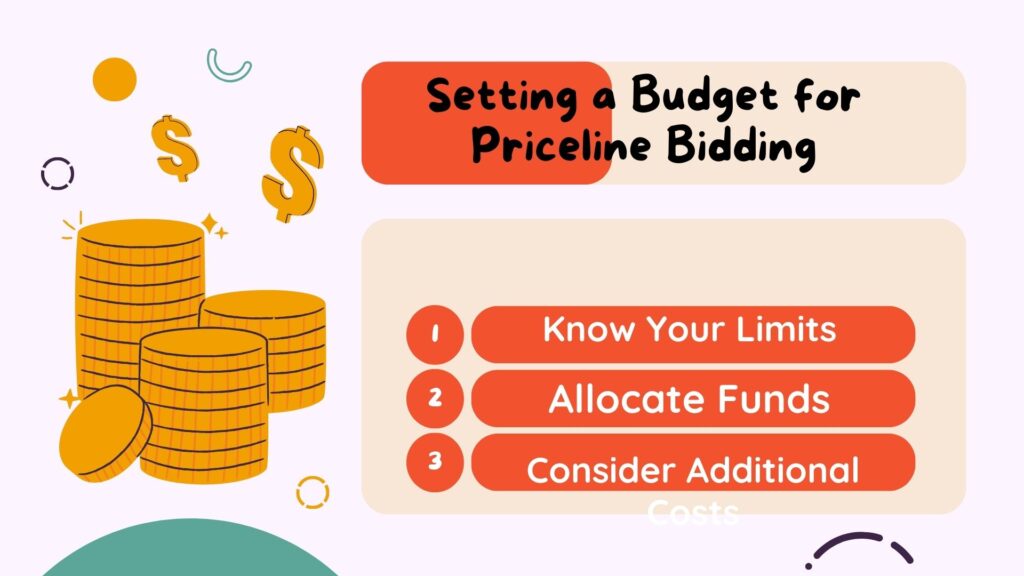
Before diving into bidding, it’s crucial to establish a budget. Knowing your maximum spending limit will guide your bidding strategy and prevent overspending.
Setting a budget is a crucial step in effectively using Priceline’s bidding system. It involves determining the maximum amount of money you’re willing to spend on a hotel room, flight, or rental car. Here’s an expanded explanation along with an example:
Setting a Budget for Priceline Bidding
Importance of Setting a Budget
Before diving into bidding on Priceline, it’s essential to establish a clear budget. This not only helps you stay within your financial limits but also guides your bidding strategy to ensure you’re getting the best value for your money.
How to Set a Budget
- Know Your Limits: Begin by assessing your overall travel budget. Consider factors such as accommodation costs, transportation expenses, meals, and any additional activities you plan to enjoy during your trip.
- Allocate Funds: Once you have a total budget in mind, allocate a portion of it specifically for lodging, flights, or rental cars, depending on what you’re bidding for on Priceline.
- Consider Additional Costs: Factor in any additional fees or taxes that may apply to your bid. While Priceline often provides estimated total costs, it’s wise to have a buffer for unexpected charges.
Example of Setting a Budget
Let’s say you’re planning a weekend getaway to New York City. Your total travel budget is $1,000, with $400 allocated for accommodation. After researching average hotel rates in NYC for your desired dates, you find that the market rate for a 4-star hotel in your preferred area is around $200 per night.
Based on this information, you decide to set your bidding budget at $150 per night, allowing some room for incremental increases during the bidding process. This way, you’re aiming to secure a room at a discounted rate while still staying within your overall budget.
Benefits of Setting a Budget
- Financial Discipline: Setting a budget helps you maintain financial discipline and avoid overspending on travel expenses.
- Focused Bidding: Having a predetermined budget allows you to focus your bidding efforts on finding the best deals within your price range.
- Optimized Savings: By strategically bidding within your budget, you maximize savings and ensure that you’re getting the most value for your money.
Setting a budget is not only a practical approach to managing your travel expenses but also empowers you to make informed decisions when bidding on Priceline.
Researching Market Rates
Researching current market rates for hotels or flights in your desired destination is essential. This information provides a baseline for your bids and helps you determine competitive rates.
Researching market rates is a crucial step in preparing to bid on Priceline effectively. Here’s an expanded explanation along with some websites you can use for your research:
Researching Market Rates for Priceline Bidding
Importance of Researching Market Rates
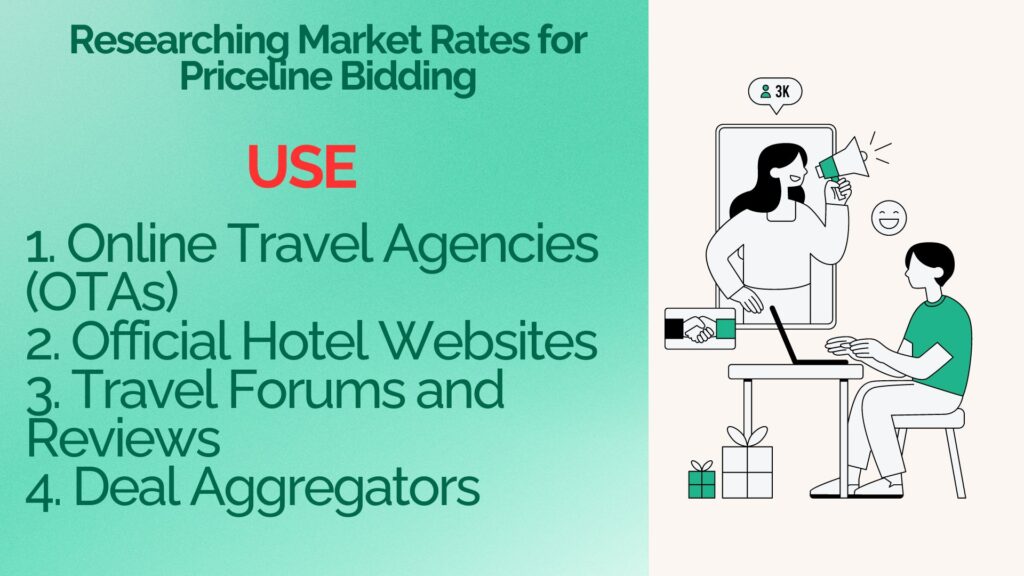
Understanding the current market rates for hotels, flights, or rental cars in your desired destination is essential for successful bidding on Priceline. It gives you a benchmark to compare your bids and ensures that you’re offering competitive prices.
How to Research Market Rates
- Online Travel Agencies (OTAs): Websites like Expedia, Booking.com, and Hotels.com provide comprehensive listings of hotels with their respective rates. Use these platforms to gauge the average cost of accommodations in your chosen area.
- Official Hotel Websites: Check the websites of specific hotels you’re interested in to see their standard rates. Some hotels may offer special promotions or discounts for direct bookings.
- Travel Forums and Reviews: Platforms like TripAdvisor and Yelp not only offer reviews but also provide insights into pricing trends and popular destinations. Reading traveler experiences can give you a sense of what to expect in terms of costs.
- Deal Aggregators: Websites like Trivago and Kayak aggregate deals from various sources, allowing you to compare prices across different platforms easily.
Example of Researching Market Rates
Let’s continue with the example of planning a trip to New York City. You visit Expedia and search for hotels in NYC for your travel dates. You notice that 4-star hotels in Manhattan range from $150 to $300 per night, depending on the location and amenities.
Next, you check the official websites of a few hotels you’re interested in to see if they offer any exclusive deals or discounts. Additionally, you browse through travel forums on TripAdvisor to see what other travelers have paid for similar accommodations in NYC recently.
After gathering this information, you have a clear picture of the market rates and can adjust your bidding strategy on Priceline accordingly.
Websites for Researching Market Rates
- Expedia: www.expedia.com
- Booking.com: www.booking.com
- Hotels.com: www.hotels.com
- TripAdvisor: www.tripadvisor.com
- Trivago: www.trivago.com
- Kayak: www.kayak.com
Using these websites, you can gather comprehensive data on market rates, trends, and deals, enabling you to make informed decisions when bidding on Priceline.
Timing Your Bid
Timing plays a crucial role in bidding success. Consider factors like peak travel seasons, weekday versus weekend rates, and upcoming events in your destination that might impact pricing.
Timing your bid strategically is a key factor in maximizing your chances of success on Priceline. Here’s an expanded explanation along with an example:
Timing Your Bid Strategically on Priceline
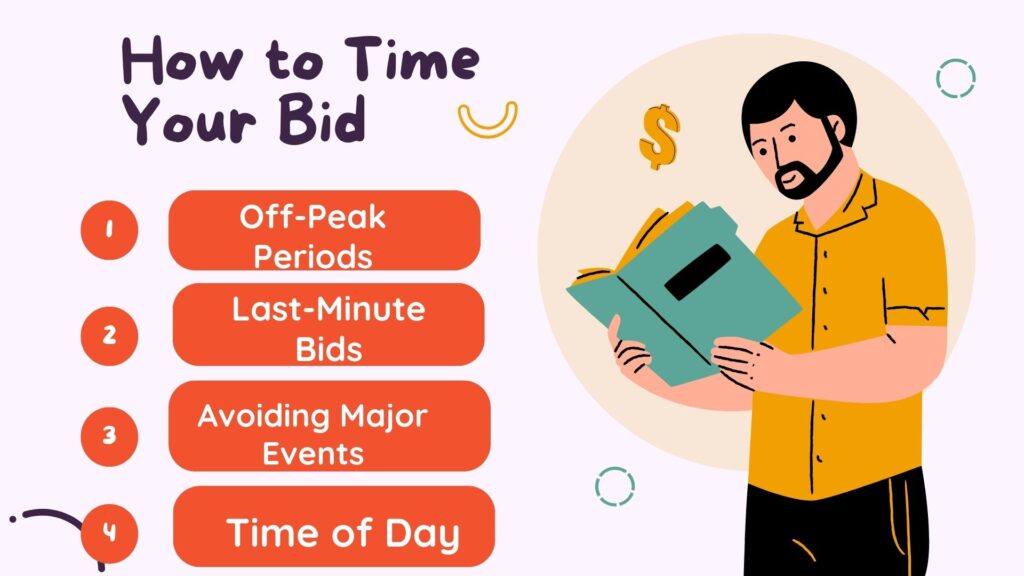
Importance of Timing
The timing of your bid can significantly impact its success on Priceline. Factors such as peak travel seasons, day of the week, and upcoming events in your destination can influence pricing and availability. Timing your bid strategically increases the likelihood of securing the best deals.
How to Time Your Bid
- Off-Peak Periods: Consider bidding during off-peak travel periods when demand is lower. This includes weekdays, shoulder seasons (between peak and off-peak), and times when major events or holidays are not taking place.
- Last-Minute Bids: If you’re flexible with travel dates, try bidding last-minute. Hotels and airlines may lower prices to fill vacant rooms or seats, offering great deals to spontaneous travelers.
- Avoiding Major Events: Be aware of major events, festivals, or conferences in your destination. Prices tend to spike during these times, making it challenging to secure discounted rates through bidding.
- Time of Day: Some travelers find success by bidding late at night or early in the morning when fewer users are active on the platform. This can lead to less competition and potentially lower bids.
Example of Timing Your Bid
Let’s say you’re planning a trip to Las Vegas for a weekend getaway. You’ve researched market rates and identified that weekdays generally have lower hotel prices compared to weekends, especially during non-event periods.
Based on this information, you decide to bid on Priceline for a 4-star hotel in Las Vegas for a Thursday to Sunday stay. You avoid bidding during major conventions or holiday weekends when prices are typically higher.
You also monitor prices on Priceline leading up to your desired travel dates. A week before your trip, you notice a slight drop in hotel rates for Thursday nights, indicating a potential opportunity to bid lower and secure a better deal.
By timing your bid strategically and staying aware of market trends, you increase your chances of winning bids at favorable prices on Priceline.
Benefits of Strategic Timing
- Cost Savings: Bidding during off-peak periods or last-minute can lead to significant cost savings.
- Increased Availability: Timing your bid well ensures better availability of discounted options, as fewer users may be bidding at those times.
- Competitive Advantage: Avoiding peak periods and strategically choosing bid times gives you a competitive advantage in securing the best deals.
By understanding the importance of timing and implementing a strategic approach to bidding, you can optimize your experience and savings on Priceline.
Tips for Strategic Bidding
Starting Low and Incrementing
Begin your bid below the market rate to leave room for incremental increases. Gradually increase your bid if initial attempts are unsuccessful.
Utilizing Name Your Own Price Tool
Priceline’s “Name Your Own Price” tool allows you to specify your desired price and preferred amenities. Use this feature strategically to tailor bids to your budget and preferences.
Example of Utilizing Priceline’s Name Your Own Price Tool
Scenario:
You’re planning a trip to San Francisco and want to book a 4-star hotel at a discounted rate using Priceline’s Name Your Own Price tool.
Steps to Utilize Name Your Own Price Tool:
- Specify Your Preferences:
- Go to Priceline’s website and navigate to the “Name Your Own Price” section for hotels.
- Select your desired city (San Francisco), star rating (4-star), and preferred neighborhood or area.
- Choose your travel dates and the number of rooms needed.
- Enter Your Desired Price:
- Priceline will prompt you to enter the price you’re willing to pay per night for the 4-star hotel in San Francisco.
- Based on your research and budget, enter a competitive yet reasonable price that reflects the value you expect.
- Review and Submit Your Bid:
- Review your bid details, including the total cost for the duration of your stay.
- Double-check your travel dates and preferences to ensure accuracy.
- Once satisfied, submit your bid to Priceline.
- Wait for Confirmation:
- Priceline will process your bid and notify you if it’s accepted or if a counteroffer is made.
- If your bid is accepted, you’ll receive confirmation along with payment details to finalize your booking.
- If a counteroffer is presented, you can choose to accept it or adjust your bid accordingly.
Example Bid:
Let’s say you’ve done research and found that 4-star hotels in your preferred area of San Francisco typically range from $200 to $300 per night. Based on your budget, you decide to bid $150 per night using Priceline’s Name Your Own Price tool.
After submitting your bid, Priceline processes it and informs you that your bid has been accepted at $150 per night for a 4-star hotel in San Francisco during your specified dates. You receive confirmation and proceed with payment, securing a discounted rate for your accommodation.
Benefits of Using Name Your Own Price Tool:
- Cost Savings: By naming your own price, you have the opportunity to secure a lower rate than the market average.
- Flexibility: The tool allows you to specify your budget and preferences, giving you flexibility in choosing accommodations that meet your criteria.
- Competitive Advantage: Utilizing Name Your Own Price tool can give you a competitive advantage in accessing discounted rates not available through standard booking methods.
By effectively utilizing Priceline’s Name Your Own Price tool, you can enjoy savings and find quality accommodations that fit your budget and preferences.
Flexibility with Travel Dates
Being flexible with travel dates can significantly enhance your bidding success. Avoiding peak travel periods increases the likelihood of securing lower prices.
Best Practices for Winning Bids
Monitoring Your Bids
Stay vigilant by monitoring your bids regularly. Adjust your strategy based on market fluctuations and competitor activity.
Being Patient
Patience is key when bidding on Priceline. It may take several attempts before securing the best deal, so persistence pays off.
Leveraging Loyalty Programs
Utilize loyalty programs offered by Priceline or affiliated brands to access exclusive deals and discounts.
Leveraging loyalty programs can be a valuable strategy when using platforms like Priceline. Here’s an expanded explanation of how to leverage loyalty programs effectively:
Leveraging Loyalty Programs for Priceline Bookings
Importance of Loyalty Programs
Many hotels, airlines, and car rental companies offer loyalty programs to reward repeat customers with benefits such as discounts, upgrades, and exclusive offers. Leveraging these programs can enhance your Priceline bookings and provide additional value.
How to Leverage Loyalty Programs
- Sign Up for Loyalty Programs:
- Join loyalty programs offered by hotels, airlines, and car rental agencies that you frequently use or plan to book through Priceline.
- Take note of any special perks or benefits offered to loyalty members, such as discounted rates, free upgrades, or bonus points.
- Link Loyalty Accounts to Priceline:
- Some loyalty programs allow you to link your account to third-party platforms like Priceline.
- Check if Priceline partners with your preferred loyalty programs and follow the steps to link your accounts for potential rewards.
- Earn and Redeem Points:
- Earn loyalty points or miles through your bookings on Priceline or affiliated partners.
- Monitor your points balance and consider redeeming them for discounts or freebies on future bookings made through Priceline.
- Access Exclusive Deals:
- Loyalty program members often receive exclusive deals and promotions not available to the general public.
- Keep an eye out for special offers specifically tailored to loyalty members when browsing Priceline’s options.
Example of Leveraging Loyalty Programs:
Let’s say you’re a member of a major hotel chain’s loyalty program, offering benefits such as discounted rates and free room upgrades. When booking a hotel through Priceline, you link your loyalty account to access these perks.
During the booking process, Priceline recognizes your loyalty status and may display exclusive rates or bonus points opportunities for loyalty members. You book a 4-star hotel in Miami through Priceline and receive a discounted rate and complimentary room upgrade as a loyalty program member.
Additionally, you earn loyalty points for this booking, which you can later redeem for discounts on future Priceline bookings or other travel-related expenses.
Benefits of Leveraging Loyalty Programs:
- Cost Savings: Loyalty programs often offer discounted rates and special deals, leading to cost savings on Priceline bookings.
- Enhanced Benefits: Loyalty members may enjoy perks like room upgrades, complimentary amenities, and priority service.
- Accumulate Rewards: Earn loyalty points or miles with each booking, accumulating rewards that can be redeemed for future travel benefits.
By leveraging loyalty programs in conjunction with Priceline bookings, travelers can unlock additional value, enjoy personalized benefits, and make their travel experiences more rewarding.
Conclusion
Mastering the art of strategic bidding on Priceline can unlock incredible savings and access to premium travel experiences. By implementing these tips and best practices, travelers can navigate the bidding process with confidence and secure the best deals available.
FAQs
- Is bidding on Priceline safe?
- Yes, Priceline’s bidding system is secure and offers competitive pricing options.
- Can I cancel a bid on Priceline?
- Once a bid is submitted, it cannot be canceled. However, you can adjust your bid amount or preferences.
- Are there any hidden fees with Priceline bidding?
- Priceline discloses all fees upfront, ensuring transparency in pricing.
- Can I negotiate with hotels through Priceline bidding?
- While bidding allows some flexibility, negotiations with hotels are typically not part of the process.
- What happens if my bid is accepted?
- If your bid is accepted, you’ll receive confirmation and payment details to finalize your booking.
